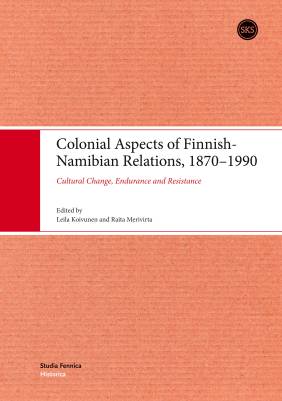Colonial Aspects of Finnish-Namibian Relations, 1870-1990 — Cultural Change, Endurance and Resistance
Koivunen, Leila; Merivirta, RaitaProduktinformation
| Titel: | Colonial Aspects of Finnish-Namibian Relations, 1870-1990 — Cultural Change, Endurance and Resistance | ||
| Författare: | Koivunen, Leila (Författare) Merivirta, Raita (Författare) |
||
| Artikelnummer: | 9789518588859 | ||
| Form: | Mjukband | ||
| Tillgänglighet: | Leveranstid 7-14 dagar | ||
| Utgivningsdatum: | 24.5.2024 | ||
| Pris: | 45,00 € (39,65 € moms 0 %) | ||
|
|||
| Förlagets identifieringsnummer: | 21847242 |
| Förlag: | Suomalaisen Kirjallisuuden Seura |
| Serie: | Studia Fennica Historica 28 |
| Upplaga: | 2024 |
| Utgivningsår: | 2024 |
| Språk: | engelska |
| Antal sidor: | 220 |
| Produktgrupp: | Vår 2024 Historia Samhälle Studia Fennica Historica Books in English |
| Bibliotekssignum: | 26.2 Kristen mission, Afrika |
| ALLFO - Allmän finländsk ontologi: | lähetystyö, lähetystyöntekijät, asenteet, kolonialismi, kulttuuri-imperialismi, kansainväliset suhteet, kulttuurienvälinen vuorovaikutus, kulttuurikosketukset, kulttuuri-identiteetti, namibialaiset, suomalaiset, kulttuuriristiriidat, kulttuurin muutos, dekolonisaatio, itsenäistyminen (valtiot), historia |
| Ämnesord: | Lähetystyö, Kulttuurikontaktit, Kolonialismi, Suomi, Namibia |
This edited collection re-examines the long history of Finnish-Namibian relations through the lens of colonialism without colonies as well as anti-colonialism.
The book argues that although Finland never acquired colonies, Namibia was once treated in the areas of culture and knowledge formation in a manner now recognised as colonial.
Namibian people's way of being in the world was transformed when the Finnish Missionary Society started its work in Owambo in 1870 and introduced Christianity and European modes of education, medicine, material culture and social practices. In time, cultural colonialism faded and during the Namibian struggle for independence from South African rule in 1966-1990 Finns took an actively anti-colonial approach.
Written as a collaborative effort of Namibian, Finnish and South African scholars, this book will interest historians and students of cultural and colonial history and colonialism without colonies, as well as general readers interested in Finnish-Namibian relations.
Tutustu teokseen SKS:n verkkosivuilla.
The book argues that although Finland never acquired colonies, Namibia was once treated in the areas of culture and knowledge formation in a manner now recognised as colonial.
Namibian people's way of being in the world was transformed when the Finnish Missionary Society started its work in Owambo in 1870 and introduced Christianity and European modes of education, medicine, material culture and social practices. In time, cultural colonialism faded and during the Namibian struggle for independence from South African rule in 1966-1990 Finns took an actively anti-colonial approach.
Written as a collaborative effort of Namibian, Finnish and South African scholars, this book will interest historians and students of cultural and colonial history and colonialism without colonies, as well as general readers interested in Finnish-Namibian relations.
Tutustu teokseen SKS:n verkkosivuilla.





